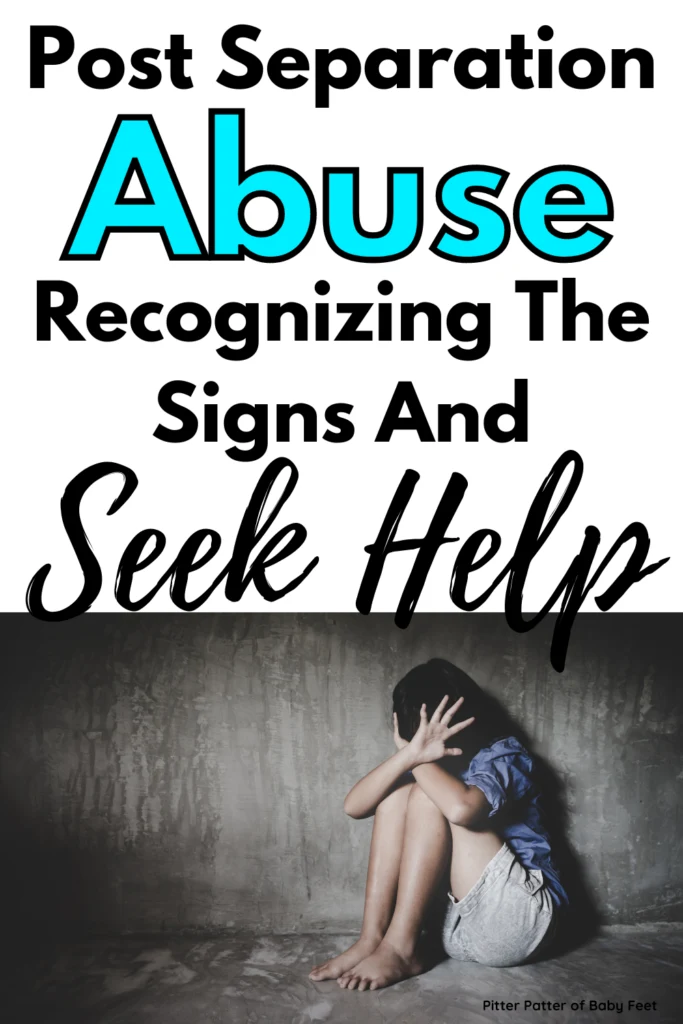
If you have recently separated from your partner, you may think that the abuse you have experienced is finally over.
However, for many survivors of domestic abuse, the abuse does not stop after the relationship has ended.
Post-separation abuse (PSA) is a form of abuse that occurs after a relationship has ended, and it can take many different forms.
This type of abuse can be just as damaging as the abuse that occurred during the relationship, and it can last for years after the relationship has ended.
Abusers may use a variety of tactics to continue to control and manipulate their former partners, including harassment, stalking, threats, and even physical violence.
If you are experiencing post-separation abuse, it is important to seek help and support as soon as possible.
Recognizing the abuse can be difficult, as it may not be as obvious as the abuse that occurred during the relationship.
However, if you are feeling afraid, intimidated, or controlled by your former partner, it is important to take those feelings seriously.
You do not have to go through this alone! There are resources available to help you stay safe and take steps to protect yourself from further abuse.
Disclosure: Bear in mind that some of the links in this post are affiliate links and if you click on them to make a purchase I will earn a commission. Keep in mind that I link these companies and their products because of their quality and not because of the commission I receive from your purchases. The decision is yours, and whether or not you decide to buy something is completely up to you.
What is Post-Separation Abuse?
If you have recently separated from an abusive partner, it is important to understand what post-separation abuse is, as it can continue even after the relationship has ended.
Post-separation abuse refers to the ongoing pattern of abusive behaviors that an abuser uses to control and intimidate their former partner.
This can include a range of behaviors, such as legal abuse, economic abuse, threats and endangerment to children, isolation and discrediting, and harassment and stalking.
Separation abuse can take many forms, and it is important to recognize that it is not limited to physical violence.
In fact, many survivors of domestic abuse report that the abuse they experience after separating from their abuser is often more insidious and difficult to detect.
This is because post-separation abuse often takes the form of coercive control, which is a pattern of behavior that seeks to undermine the survivor’s sense of self-worth and autonomy.
One of the most common forms of post-separation abuse is legal abuse, which involves using the legal system to harass and intimidate the survivor.
This can include filing frivolous lawsuits, making false accusations, and using the court system to gain leverage in custody battles.
Economic abuse is another common form of post-separation abuse, which involves controlling the survivor’s access to financial resources.
This can include refusing to pay child support, sabotaging the survivor’s employment opportunities, and using debt as a means of control.
Stalking and harassment are also common forms of post-separation abuse, which can involve following the survivor, sending threatening messages, and engaging in other forms of unwanted contact.
Gaslighting and other forms of psychological abuse are also common, which can involve manipulating the survivor’s perception of reality and making them doubt their own sanity.
Neglect is another form of post-separation abuse, which involves failing to provide adequate care for the survivor’s children or pets.
It is important to recognize that this abuse is a serious issue that can have long-lasting effects on the survivor’s mental and physical health.
Related Articles: 10 Dissociation Grounding Techniques
Dissociation: Symptoms And Causes
Signs Of Financial Abuse During Divorce
Types of Post-Separation Abuse
Post-separation abuse is a form of domestic violence that occurs after the end of a relationship.
It can take many forms, including emotional, financial, and physical abuse.
Understanding the different types of post-separation abuse can help you recognize it and take steps to protect yourself.
Emotional Abuse
Emotional abuse is a common form of post-separation abuse. It involves using words or actions to control, intimidate, or manipulate a former partner.
Examples of emotional abuse include:
- Threatening to harm yourself or others if your former partner does not comply with your demands
- Insulting or belittling your former partner in front of others
- Refusing to communicate with your former partner or using communication to harass or intimidate them
- Gaslighting, which involves denying or dismissing your former partner’s feelings or experiences
Financial Abuse
Financial abuse is another form of post-separation abuse. It involves using money or financial resources to control or manipulate a former partner.
Examples of financial abuse include:
- Refusing to pay child support or alimony
- Hiding assets or income to avoid paying support or to gain an unfair advantage in legal proceedings
- Coercing your former partner into signing documents or making financial decisions that are not in their best interests
- Sabotaging your former partner’s credit or financial stability
Physical Abuse
Physical abuse is the most visible form of post-separation abuse. It involves using physical force or violence to control or harm a former partner.
Examples of physical abuse include:
- Hitting, kicking, or punching your former partner
- Threatening your former partner with a weapon or using a weapon against them
- Stalking or harassing your former partner in person or online
- Damaging your former partner’s property or possessions
It is important to remember that post-separation abuse can take many forms, and it is not always easy to recognize.
If you are experiencing any form of abuse, it is important to seek help and support from a trusted friend, family member, or professional.

Effects of Post-Separation Abuse
Post-separation abuse can have a devastating impact on the victim’s mental, emotional, and physical well-being.
Here are some of the effects of post-separation abuse that you may experience:
Mental Health Effects
Post-separation abuse can lead to a range of mental health issues, including depression, anxiety, and post-traumatic stress disorder (PTSD).
You may feel overwhelmed, helpless, and hopeless.
You may have trouble sleeping, eating, and concentrating.
You may also experience flashbacks, nightmares, and other symptoms of PTSD.
Physical Health Effects
PSA can also have physical health effects.
You may experience headaches, stomach problems, and other physical symptoms.
You may also be at risk of developing chronic health conditions, such as high blood pressure, heart disease, and diabetes, due to the ongoing stress of the abuse.
Financial Effects
It can also have significant financial effects. You may have to pay legal fees and other expenses related to the abuse.
You may also lose income due to missed work or job loss.
In some cases, the abuser may also try to control your finances, leaving you financially vulnerable.
Effects on Children
Children who witness abuse may experience a range of emotional and behavioral problems, including anxiety, depression, and aggression.
They may also struggle with academic performance and social relationships.
In conclusion, post-separation abuse can have a profound impact on your mental, physical, and financial well-being, as well as the well-being of your children.

Protective Measures For Victims
If you are a victim of PSA, there are several protective measures you can take to keep yourself safe.
This section will cover some of the legal options, safety planning, and support groups available to you.
Legal Options
Getting a restraining order can be an effective legal option to protect yourself from an abuser.
This legal document requires the abuser to stay away from you, and research shows that these documents reduce the risk of violence.
You can get a temporary order of protection for a short time, usually ten days, while you work on getting a permanent order.
In addition to restraining orders, you can also file for divorce or seek custody of your children.
These legal options can help you to separate yourself from your abuser and protect your rights.
Safety Planning
Creating a safety plan is an important step in protecting yourself from post separation abuse.
A safety plan is a personalized, practical plan that can help you avoid dangerous situations and protect yourself and your children.
Your safety plan should include steps to take in case of an emergency, such as having a safe place to go, having a code word to use with family or friends to indicate that you need help, and having important documents and phone numbers easily accessible.
Support Groups
Joining a support group can be a helpful way to connect with others who have experienced post separation abuse.
Support groups can provide emotional support, help you to feel less alone, and offer practical advice and resources.
You can find support groups through local domestic violence organizations, online forums, or through your therapist or counselor.
Remember, taking steps to protect yourself from post separation abuse can be difficult, but it is important for your safety and well-being.
By utilizing legal options, creating a safety plan, and connecting with support groups, you can take control of your situation and move towards a safer and healthier future.
Related Articles: 15 Deadly Narcissistic Characteristics
8 Things That Happen After Leaving A Narcissist For Good
12 Signs Of Manipulation Abuse
How to Help Someone Experiencing Post-Separation Abuse
If you know someone who is experiencing post-separation abuse, it can be difficult to know how to help them.
Here are some ways you can support them:
Listen and Believe Them
One of the most important things you can do is to listen to your friend or loved one and believe them.
Abusers often try to convince their victims that they are the ones at fault, and it can be hard for survivors to share their experiences.
Let them know that you believe them and that you are there for them.
Help Them Create a Safety Plan
A safety plan is a personalized, practical plan that can help someone stay safe while dealing with abuse.
You can help your friend or loved one create a safety plan that is tailored to their specific situation.
This may include things like:
- Identifying safe places to go if they need to leave
- Creating a code word or signal to use if they need help
- Making copies of important documents and keeping them in a safe place
- Changing their phone number or email address
- Installing security cameras or other safety measures in their home
Offer Practical Support
Survivors of abuse may need practical support to help them navigate the aftermath of abuse.
You can offer to help with things like:
- Finding a therapist or counselor
- Going with them to court hearings or meetings with lawyers
- Helping them find a new place to live
- Providing financial assistance if possible
- Helping them with childcare or other responsibilities
Encourage Them to Seek Professional Help
While you can provide a lot of support to your friend or loved one, it’s important to encourage them to seek professional help as well.
A therapist or counselor can help them work through the trauma of abuse and develop coping skills.
You can offer to help them find a therapist or accompany them to their appointments.
Remember, supporting someone who is experiencing post-separation abuse can be challenging, but it’s important to be there for them.
By listening, believing, and offering practical support, you can help your friend or loved one navigate this difficult time.

Parental Alienation and Counter-Parenting
Parental alienation is a form of post-separation abuse that involves one parent trying to turn a child against the other parent.
This behavior is often seen during divorce or separation and can have serious consequences for the child and the targeted parent.
Counter-parenting is another form of post-separation abuse that involves one parent undermining the authority and decisions of the other parent.
This behavior can include making false claims about the other parent, refusing to communicate with them, and ignoring their parenting decisions.
Both parental alienation and counter-parenting can be used as tactics to isolate the child and the targeted parent from each other.
The abuser may try to limit the child’s contact with the targeted parent, monitor their communication, and make threats to keep them apart.
If you are a protective parent who is experiencing parental alienation or counter-parenting, it is important to seek help from professionals.
Family court may be able to provide legal protection and support for you and your child. It is crucial to document any incidents of abuse and gather evidence to support your case.
It is also important to educate yourself about the signs of parental alienation and counter-parenting.
These behaviors can be subtle and difficult to detect, but they can have a significant impact on the child’s well-being and the targeted parent’s mental health.
In some cases, the abuser may claim that the targeted parent is engaging in parental alienation.
This tactic can shift the burden of proof and force the targeted parent to defend themselves against false accusations.
It is important to be aware of this tactic and gather evidence to support your case.
Overall, parental alienation and counter-parenting are serious forms of post-separation abuse that can have long-lasting effects on the child and the targeted parent.
It is important to seek help from professionals and educate yourself about these behaviors to protect yourself and your child.
Impact on Children
Abuse has a significant impact on children, who are often caught in the crossfire between their parents.
Children who witness or experience abuse after their parents’ separation may suffer from physical, emotional, and psychological harm.
One of the most common impacts of post-separation abuse on children is child abuse.
Abusers often use children as pawns to control and manipulate their former partners, leading to physical, emotional, and sexual abuse.
Children may also be subjected to neglect, as abusers may withhold necessary resources such as food, clothing, and medical care to punish or control their former partners.
Children who witness or experience abuse may suffer from anxiety, depression, and post-traumatic stress disorder (PTSD).
They may also have difficulty forming healthy relationships and may struggle with self-esteem and self-worth.
In addition, post-separation abuse can interfere with children’s education and social development.
Children who are subjected to abuse may miss school or have difficulty concentrating in class, leading to poor academic performance.
They may also struggle to form healthy relationships with peers and may have difficulty trusting others.
It is important to note that the impact of post-separation abuse on children can vary depending on the severity and duration of the abuse, as well as the child’s age and developmental stage.
However, it is clear that post-separation abuse can have long-lasting effects on children’s physical, emotional, and psychological well-being.
If you or someone you know is experiencing post-separation abuse, it is crucial to seek help and support to protect yourself and your children from harm.
Related Articles: Say It: Emotional Abuse Is Still Abuse
Depression Symptoms No One Talks About
How To Recognize Anxiety Triggers To Make Life Easier
Final Thoughts
Post-separation abuse is a serious issue that affects many individuals who have ended a relationship with an abusive partner.
It is a pattern of ongoing, willful intimidation that can take many forms, including legal abuse, economic abuse, threats and endangerment to children, isolation and discrediting, and harassment and stalking.
If you are experiencing post-separation abuse, it is important to seek help and support.
You do not have to face this alone. There are many resources available to help you, including hotlines, support groups, and legal services.
It is also important to document any incidents of abuse and to keep a record of any communication with your abuser.
This can be helpful if you need to seek a restraining order or take legal action.
Remember that post-separation abuse is not your fault and you deserve to be treated with respect and dignity.
You have the right to live your life free from fear and intimidation.
If you know someone who is experiencing post-separation abuse, it is important to offer support and understanding.
Let them know that you believe them and that you are there to help.
Encourage them to seek professional help and to take steps to protect themselves.
Together, we can work to raise awareness about post-separation abuse and to support those who are affected by it.

